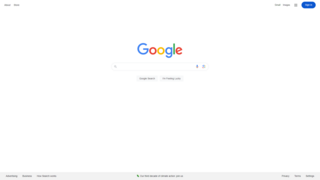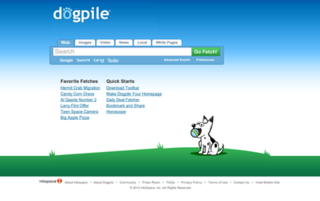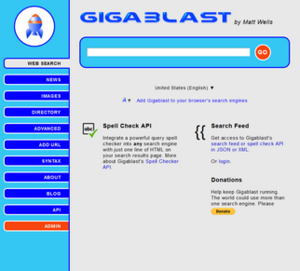
Google Search is a search engine provided and operated by Google. Handling more than 3.5 billion searches per day, it has a 92% share of the global search engine market. It is the most-visited website in the world. Additionally, it is the most searched and used search engine in the entire world.
WebCrawler is a search engine, and one of the oldest surviving search engines on the web today. For many years, it operated as a metasearch engine. WebCrawler was the first web search engine to provide full text search.
Search engine optimization (SEO) is the process of improving the quality and quantity of website traffic to a website or a web page from search engines. SEO targets unpaid traffic rather than direct traffic or paid traffic. Unpaid traffic may originate from different kinds of searches, including image search, video search, academic search, news search, and industry-specific vertical search engines.

Dogpile is a metasearch engine for information on the World Wide Web that fetches results from Google, Yahoo!, Yandex, Bing, and other popular search engines, including those from audio and video content providers such as Yahoo!.

A metasearch engine is an online information retrieval tool that uses the data of a web search engine to produce its own results. Metasearch engines take input from a user and immediately query search engines for results. Sufficient data is gathered, ranked, and presented to the users.

Yippy was a metasearch engine that grouped searched results into clusters. It was originally developed and released by Vivísimo in 2004 under the name Clusty, before Vivisimo was later acquired by IBM and Yippy was sold in 2010 to a company now called Yippy, Inc. At the time, the website received 100,000 unique visitors a month.
Infoseek was an American internet search engine founded in 1994 by Steve Kirsch.

Google data centers are the large data center facilities Google uses to provide their services, which combine large drives, computer nodes organized in aisles of racks, internal and external networking, environmental controls, and operations software.

Matthew Cutts is an American software engineer. Cutts is the former Administrator of the United States Digital Service. He was first appointed as acting administrator, to later be confirmed as full administrator in October 2018. Cutts previously worked with Google as part of the search quality team on search engine optimization issues. He is the former head of the web spam team at Google.

Go.com is a portal for Disney content that was created after The Walt Disney Company acquired the search engine Infoseek. Go.com is operated by Disney Interactive’s Disney Online. It began as a web portal launched by Jeff Gold. Go.com includes content from ABC News, which is owned by Walt Disney Television and is hosted under a .go.com name. Along with Time Warner's Pathfinder.com, Go.com proved to be an expensive failure for its parent company, as web users largely preferred to use search engines to access content directly, rather than using directories. In 2013, the site was transitioned from a general-interest portal to a simple landing page.

A search engine is a software system that finds web pages that match a web search. They search the World Wide Web in a systematic way for particular information specified in a textual web search query. The search results are generally presented in a line of results, often referred to as search engine results pages (SERPs). The information may be a mix of hyperlinks to web pages, images, videos, infographics, articles, and other types of files. Some search engines also mine data available in databases or open directories. Unlike web directories and social bookmarking sites, which are maintained by human editors, search engines also maintain real-time information by running an algorithm on a web crawler. Any internet-based content that cannot be indexed and searched by a web search engine falls under the category of deep web.

Microsoft Bing, commonly referred to as Bing, is a web search engine owned and operated by Microsoft. The service traces its roots back to Microsoft's earlier search engines, including MSN Search, Windows Live Search, and Live Search. Bing offers a broad spectrum of search services, encompassing web, video, image, and map search products, all developed using ASP.NET.

Disney Interactive is an American video game and internet company that oversees various websites and interactive media owned by The Walt Disney Company.

DMOZ was a multilingual open-content directory of World Wide Web links. The site and community who maintained it were also known as the Open Directory Project (ODP). It was owned by AOL but constructed and maintained by a community of volunteer editors.

Google Chrome is a cross-platform web browser developed by Google. It was first released in 2008 for Microsoft Windows, built with free software components from Apple WebKit and Mozilla Firefox. Versions were later released for Linux, macOS, iOS, and also for Android, where it is the default browser. The browser is also the main component of ChromeOS, where it serves as the platform for web applications.

DuckDuckGo (DDG) is an Internet privacy company. DuckDuckGo offers a number of products oriented towards helping people protect their privacy online, most notably, a private search engine, a tracker-blocking browser extension, email protection and app tracking protection.

Chromium is a free and open-source web browser project, mainly developed and maintained by Google. This codebase provides the vast majority of code for the Google Chrome browser, which is proprietary software and has some additional features. Chromium's logo is identical in shape to that of Google Chrome, but with blue colors instead of being multicolor.
A browser speed test is a computer benchmark that scores the performance of a web browser, by measuring the browser's efficiency in completing a predefined list of tasks. In general the testing software is available online, located on a website, where different algorithms are loaded and performed in the browser client. Typical test tasks are rendering and animation, DOM transformations, string operations, mathematical calculations, sorting algorithms, graphic performance tests and memory instructions. Browser speed tests have been used during browser wars to prove superiority of specific web browsers. The popular Acid3 test is no particular speed test but checks browser conformity to web standards.
Web search engines are listed in tables below for comparison purposes. The first table lists the company behind the engine, volume and ad support and identifies the nature of the software being used as free software or proprietary software. The second and third table lists internet privacy aspects along with other technical parameters, such as whether the engine provides personalization.













